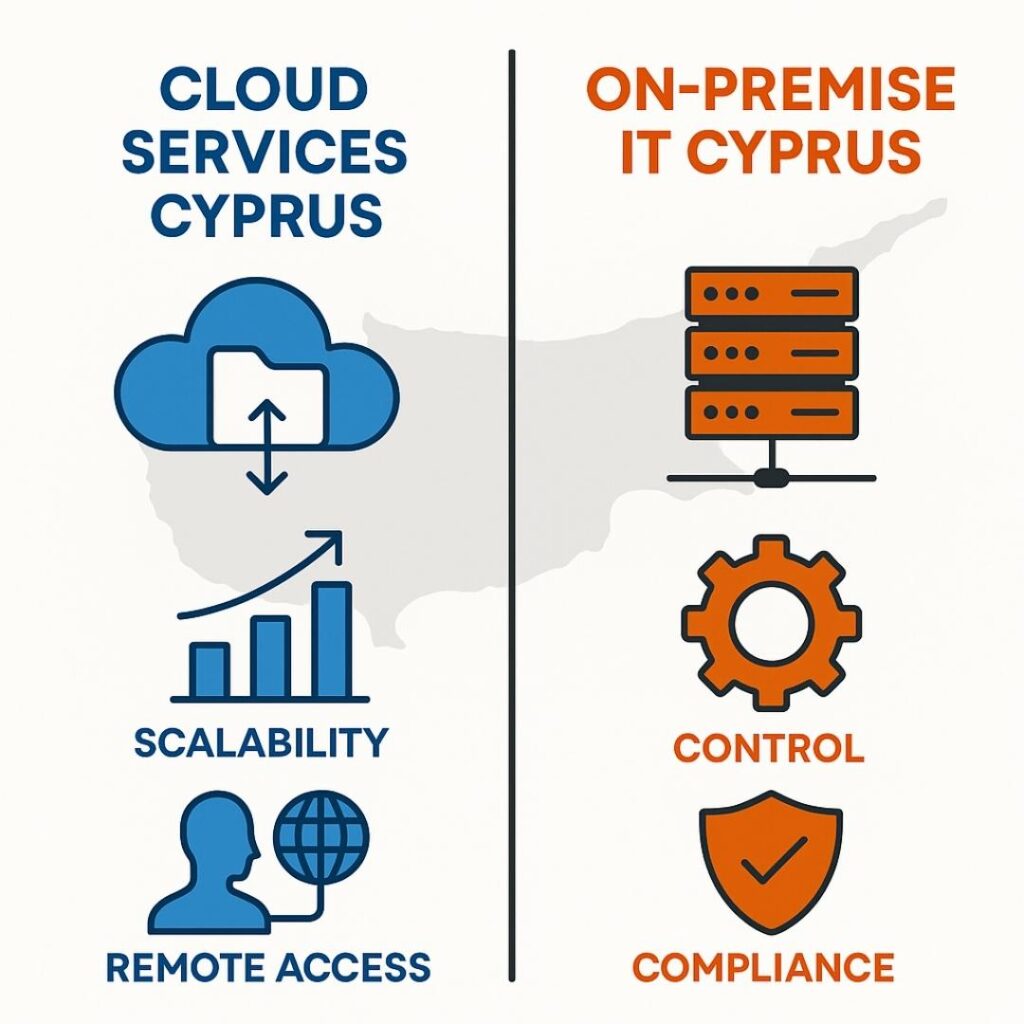Introduction
Cyprus SMEs in 2025 face a common IT dilemma: should they invest in cloud services or stick with on-premise systems? The choice affects not just costs, but also flexibility, security, and compliance. Get it right, and you can scale smoothly, protect your data, and control spending. Get it wrong, and you risk unnecessary expenses or IT headaches. This article breaks down what each option means, how they compare, and what makes sense for businesses in Cyprus today.

Cloud Services vs On-Premise: What Cyprus SMEs Need to Know
What Are Cloud Services?
Cloud services let businesses run applications, store data, and access tools over the internet rather than relying on in-house servers. Instead of buying and maintaining hardware, you pay a monthly or yearly subscription.
Benefits of cloud services:
- Scalability: add or remove users quickly.
- Predictable monthly costs.
- Access from anywhere, ideal for remote or hybrid teams.
- Automatic updates and security patches.
Common examples in Cyprus include Microsoft 365 for productivity, Google Workspace for collaboration, and cloud backup providers that keep business data safe.
For many SMEs, cloud solutions mean less time worrying about IT and more time focusing on growth.
What Is On-Premise IT?
On-premise IT means running your own servers, storage, and software in-house. Businesses purchase the hardware, install the software, and manage everything themselves or with a local IT provider.
Benefits of on-premise IT:
- Full control over your systems and data.
- Customization to fit unique business processes.
- Potentially stronger security if managed by skilled IT staff.

Drawbacks:
- High upfront costs for servers, licenses, and installation.
- Ongoing maintenance, energy, and upgrade expenses.
- Risk of downtime if equipment fails.
Some industries in Cyprus, especially those with strict compliance rules, still prefer on-premise IT for the control it offers.
Cost Comparison: Cloud vs On-Premise
For SMEs in Cyprus, cost is often the deciding factor.
Cloud services:
- Lower upfront investment.
- Predictable monthly or annual subscriptions.
- No need for dedicated in-house IT staff.
- Costs scale with usage.
On-premise IT:
- High upfront spend on servers, storage, and software.
- Additional costs for electricity, cooling, and space.
- Regular expenses for upgrades and maintenance.
- May require in-house or contracted IT support.
Example scenarios:
- A 20-person marketing agency in Nicosia saved 40% by moving to cloud services, avoiding the purchase of costly servers.
- An accounting firm chose on-premise servers to maintain full control over sensitive financial data, accepting higher upfront costs in exchange for compliance and peace of mind.
The bottom line: cloud looks cheaper initially, but long-term savings depend on your industry and growth plans. Read the relevant blog post for 7 essential strategies for IT infrastructure.
Security and Compliance in Cyprus
Security is a major concern for SMEs. Both models offer advantages and risks. For more information about us and case studies, read this relevant blog post.
Cloud services:
- Providers include advanced protections like encryption, firewalls, and intrusion detection.
- Regular security updates.
- Compliance with GDPR and international standards.
On-premise IT:
- More direct control over data handling.
- Security depends on the skill of your IT team.
- Higher responsibility for ensuring GDPR compliance.
For Cyprus businesses working with sensitive customer data, understanding GDPR obligations is essential. Cloud services often make compliance easier, while on-premise systems require strong internal processes.
Which Works Best for Cyprus SMEs?
There is no universal answer. The best choice depends on your budget, industry, and long-term goals.
- Choose cloud services if you want flexibility, predictable costs, and easy scaling.
- Choose on-premise IT if your business requires strict control, specialized compliance, or you already have IT staff.
- Hybrid solutions can combine both: for example, using cloud email while keeping sensitive databases on local servers.
Practical tip: Review your current IT costs and compliance requirements, then consult a local IT provider who understands Cyprus business needs.
Conclusion
Migrating to the cloud doesn’t have to be overwhelming. By following a structured timeline, SMEs in Cyprus can reduce risks and get the full benefits of cloud services.
For tailored migration planning, contact ACE Networks.
To help you plan your next steps, download our free Cloud Migration Timeline Template. It’s a step-by-step planning guide designed for Cyprus SMEs to reduce risks and migrate smoothly. Get it here.

